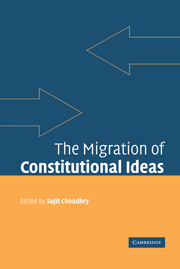Book contents
- Frontmatter
- Contents
- List of contributors
- Acknowledgements
- 1 Migration as a new metaphor in comparative constitutional law
- PART I The methodology of comparativism
- PART II Convergence toward a liberal democratic model?
- 5 Questioning the migration of constitutional ideas: rights, constitutionalism and the limits of convergence
- 6 Spreading liberal constitutionalism: an inquiry into the fate of free speech rights in new democracies
- 7 Underlying principles and the migration of reasoning templates: a trans-systemic reading of the Quebec Secession Reference
- 8 Migrating marriages and comparative constitutionalism
- PART III Comparative constitutional law, international law and transnational governance
- PART IV Comparative constitutional law in action – constitutionalism post 9/11
- Index
7 - Underlying principles and the migration of reasoning templates: a trans-systemic reading of the Quebec Secession Reference
Published online by Cambridge University Press: 25 July 2009
- Frontmatter
- Contents
- List of contributors
- Acknowledgements
- 1 Migration as a new metaphor in comparative constitutional law
- PART I The methodology of comparativism
- PART II Convergence toward a liberal democratic model?
- 5 Questioning the migration of constitutional ideas: rights, constitutionalism and the limits of convergence
- 6 Spreading liberal constitutionalism: an inquiry into the fate of free speech rights in new democracies
- 7 Underlying principles and the migration of reasoning templates: a trans-systemic reading of the Quebec Secession Reference
- 8 Migrating marriages and comparative constitutionalism
- PART III Comparative constitutional law, international law and transnational governance
- PART IV Comparative constitutional law in action – constitutionalism post 9/11
- Index
Summary
Introduction
One of the most common assumptions in the field of comparative law is that modes of reasoning are so intrinsically intertwined with particular legal traditions, be it the common law or the civil law, that they simply cannot migrate from one tradition to another. Because they are entangled with basic jural conceptions with which they form the thickest layer of each tradition, ‘reasoning templates’, as I will call them, are presumed to be sedentary. The legitimate caution with which legal transplants involving either substantive or procedural norms are approached tends to reinforce that attitude. As a result, little attention is paid to what goes on in the ‘other’ tradition. For example, the growing common law literature on the judicial use of underlying constitutional principles generally ignores the civilian experience with the use of such principles. Its study would notably show that, in the civil law tradition, principles may sometimes allow for the sterilization of explicit legal prescriptions, which could shatter the common law myth of the passive civilian judge.
I mention this particular example because underlying constitutional principles provide an interesting starting point for studying the various ways in which constitutional ideas migrate. Due to their open-textured nature, which, by definition, requires their contextual individuation, principles may indeed serve as guises through which substantive or procedural ideas migrate. However, my goal in this chapter is not to examine potential situations where a given principle migrates from one jurisdiction to another.
- Type
- Chapter
- Information
- The Migration of Constitutional Ideas , pp. 178 - 208Publisher: Cambridge University PressPrint publication year: 2007
- 1
- Cited by



